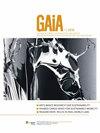口述历史访谈(OHIs):可持续发展的参与式研究方法-工具包#5
IF 1.9
4区 社会学
Q4 ENVIRONMENTAL SCIENCES
引用次数: 1
摘要
在解决与土地利用相关的可持续性问题时,回顾过去可以提供重要的信息。为此,口述历史访谈是一种有用的方法,特别是当书面资料不可用或不能充分反映某些相关社会群体的观点时,例如直接参与某种土地使用的从业者。这个工具包提供了如何使用和实施口述历史访谈的概述。本文章由计算机程序翻译,如有差异,请以英文原文为准。
Oral history interviews (OHIs): Participatory research methods for sustainability ‐ toolkit #5
When addressing land use related sustainability issues, looking to the past can contribute an important layer of information. For this, oral history interviews are a useful approach, especially when written sources are not available or do not adequately reflect the views of certain
relevant social groups, such as the practitioners directly involved in a certain land use. This toolkit provides an overview of how to use and implement oral history interviews.
求助全文
通过发布文献求助,成功后即可免费获取论文全文。
去求助
来源期刊

Gaia-Ecological Perspectives for Science and Society
ENVIRONMENTAL SCIENCES-
CiteScore
2.30
自引率
18.80%
发文量
43
审稿时长
>12 weeks
期刊介绍:
GAIA is a peer-reviewed inter- and transdisciplinary journal for scientists and other interested parties concerned with the causes and analyses of environmental and sustainability problems and their solutions.
Environmental problems cannot be solved by one academic discipline. The complex natures of these problems require cooperation across disciplinary boundaries. Since 1991, GAIA has offered a well-balanced and practice-oriented forum for transdisciplinary research. GAIA offers first-hand information on state of the art environmental research and on current solutions to environmental problems. Well-known editors, advisors, and authors work to ensure the high quality of the contributions found in GAIA and a unique transdisciplinary dialogue – in a comprehensible style.
 求助内容:
求助内容: 应助结果提醒方式:
应助结果提醒方式:


